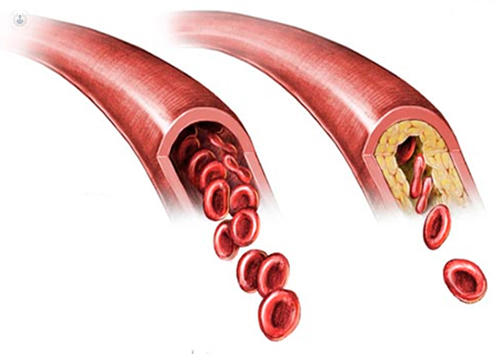

What is atherosclerosis?
Atherosclerosis is the most frequent disease of the arteries. It consists of the formation of plaque in the blood vessels through which oxygen and nutrients are transported. The plaque is a sticky substance formed by fat, cholesterol or calcium, which over time can harden and narrow the arteries causing a lack of blood flow to the tissues and organs. Often affecting the blood vessels near your heart, atherosclerosis can affect blood vessels anywhere in the body.

What are the symptoms of atherosclerosis?
In general, atherosclerosis does not show symptoms until an artery is reduced too much, or the blood flow in one part of the body slows down or gets blocked. As a result, people suffering from atherosclerosis often don’t realise until they have an emergency. Depending on which arteries are affected the following symptoms might be experienced:
- Arteries near your heart – chest pain
- Arteries near your brain – numbness in your limbs, slurred speech, drooping on one side of the face
- Arteries in your arms and legs – pain in the affected limb
- Arteries near your kidneys – high blood pressure and potentially kidney failure
What causes atherosclerosis?
The progression of atherosclerosis is slow and takes time to manifest. Although the exact cause is unknown, it is thought that damage to the artery can cause the build-up of plaque.
Damage to arteries can be caused by:
- High cholesterol
- High blood pressure
- Smoking
- Inflammatory diseases (e.g. lupus, arthritis)
- High fat content in your blood
If the venous wall is damaged, debris and blood cells build up at the injury site, and gradually this builds up, narrowing the diameter of the artery.
Can atherosclerosis be prevented?
It is possible to prevent atherosclerosis with the right lifestyle changes, including:
- A healthy diet (reduced consumption of fatty food)
- Stop smoking
- Reduce cholesterol
- Exercise regularly
- Maintain a healthy weight
What is the treatment for atherosclerosis?
The following medications can help to slow down the build-up of plaque in the arteries and potentially reverse it:
- Cholesterol medication which reduces the bad cholesterol levels in the blood (low-density lipoproteins, LDLs).
- Blood pressure medication to reduce high blood pressure (e.g. ACE inhibitors or calcium channel blockers).
- Blood-thinning medication such as aspirin.
If medication does not prove effective and more aggressive treatment is needed, surgery might be recommended. Surgically installing a stent into an affected artery will keep the artery open and blood flowing through it. Fatty deposits can also be removed surgically (endarterectomy). Bypass surgery to bypass the damaged blood vessel might be necessary.
